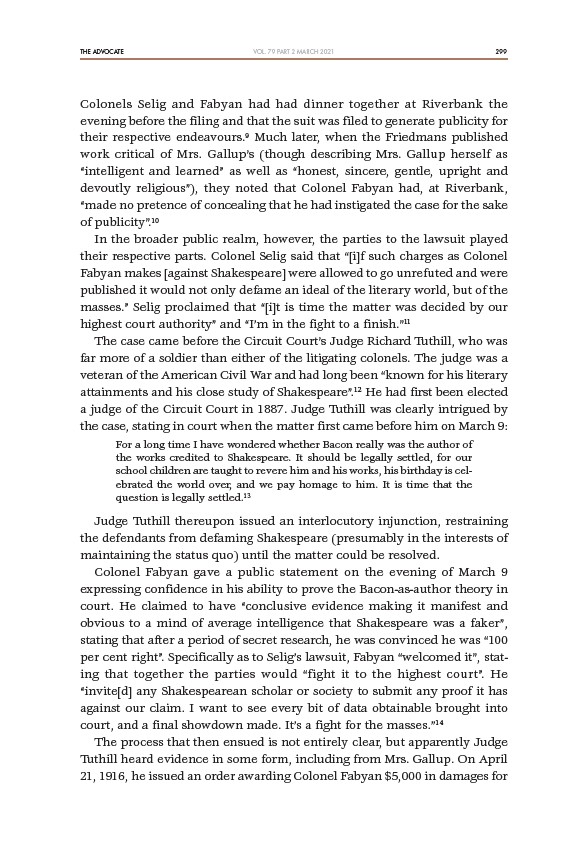
THE ADVOCATE 299
VOL. 79 PART 2 MARCH 2021
Colonels Selig and Fabyan had had dinner together at Riverbank the
evening before the filing and that the suit was filed to generate publicity for
their respective endeavours.9 Much later, when the Friedmans published
work critical of Mrs. Gallup’s (though describing Mrs. Gallup herself as
“intelligent and learned” as well as “honest, sincere, gentle, upright and
devoutly religious”), they noted that Colonel Fabyan had, at Riverbank,
“made no pretence of concealing that he had instigated the case for the sake
of publicity”.10
In the broader public realm, however, the parties to the lawsuit played
their respective parts. Colonel Selig said that “if such charges as Colonel
Fabyan makes against Shakespeare were allowed to go unrefuted and were
published it would not only defame an ideal of the literary world, but of the
masses.” Selig proclaimed that “it is time the matter was decided by our
highest court authority” and “I’m in the fight to a finish.”11
The case came before the Circuit Court’s Judge Richard Tuthill, who was
far more of a soldier than either of the litigating colonels. The judge was a
veteran of the American Civil War and had long been “known for his literary
attainments and his close study of Shakespeare”.12 He had first been elected
a judge of the Circuit Court in 1887. Judge Tuthill was clearly intrigued by
the case, stating in court when the matter first came before him on March 9:
For a long time I have wondered whether Bacon really was the author of
the works credited to Shakespeare. It should be legally settled, for our
school children are taught to revere him and his works, his birthday is celebrated
the world over, and we pay homage to him. It is time that the
question is legally settled.13
Judge Tuthill thereupon issued an interlocutory injunction, restraining
the defendants from defaming Shakespeare (presumably in the interests of
maintaining the status quo) until the matter could be resolved.
Colonel Fabyan gave a public statement on the evening of March 9
expressing confidence in his ability to prove the Bacon-as-author theory in
court. He claimed to have “conclusive evidence making it manifest and
obvious to a mind of average intelligence that Shakespeare was a faker”,
stating that after a period of secret research, he was convinced he was “100
per cent right”. Specifically as to Selig’s lawsuit, Fabyan “welcomed it”, stating
that together the parties would “fight it to the highest court”. He
“invited any Shakespearean scholar or society to submit any proof it has
against our claim. I want to see every bit of data obtainable brought into
court, and a final showdown made. It’s a fight for the masses.”14
The process that then ensued is not entirely clear, but apparently Judge
Tuthill heard evidence in some form, including from Mrs. Gallup. On April
21, 1916, he issued an order awarding Colonel Fabyan $5,000 in damages for